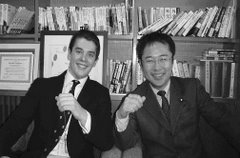Opposition parties are clamouring for the resignation of Minister for Health, Labour and Welfare,
Hokuo Yanagisawa, in response to his outrageous comment on the 27
th January claiming that women were "baby-making machines"
("kodomo o umu kikai").
For the last couple of days opposition
Dietmembers have been noticeably absent from Supplementary Budget debates, which were due to begin earlier this week. Led by the vocal attacks of female
Social Democratic Party (
SDP) leader,
Fukushima Mizuho, all main opposition parties -
SDP,
Democratic Party of Japan (
DPJ),
Japan Communist Party (
JCP) and
People's New Party (
PNP) - are refusing to take part in debates, be they budgetary or otherwise, until
Yanagisawa steps down from his post.
Thursday was the first time in seven years that a united opposition had boycotted a budget debate in normal Diet session, since a protest in 2000 concerning the number of House of Representatives seats elected through Proportional Representation. In the absence of any opposition, the ruling
Liberal Democratic Party (
LDP) continued business without oversight, following a statement by
Yanagisawa earlier that day indicating he was not considering giving up his job.
Although
Yanagisawa's comments were indeed deplorable, the question remains: Should elected
MPs be allowed to boycott important Diet debates? By their absence, the opposition parties are no longer in a position to hold the
LDP to account, and by trying to force Prime Minister Abe
Shinzo's hand, they are pursuing a line which is far from democratic.
6000 miles away, the current British Home Secretary, John Reid, has also been under extreme pressure to stand down from his position. Since the middle of January, Reid has been hit by a flurry of scandal: On January 14
th, a senior Home Office civil servant was reprimanded for the failure to keep tabs on British citizens who had offended abroad; prison overcrowding was revealed to be endemic by the end of January; and on the 27
th an English newspaper,
The News of the World, revealed that 322 convicted sex offenders were 'missing' in the UK. The Conservative and Liberal Democrats have both indicated they think Reid should resign, but like
Yanagisawa, the Minister himself has given all the signs that he intends to continue in his current position.
Yet, there are striking differences in the two affairs. The media and political opposition in the UK are calling for John Reid's resignation not for a mistaken comment, but for clear failures in his department. He has, many say, failed in a job he was chosen to do.
Yanagisawa, on the other hand, is not being accused of malpractice or a governmental mistake as Minister for Health, Labour and Welfare. If he was, many in the opposition would be in a very precarious position themselves.
Kiyomi Tsujimoto (
SDP), one of the loudest critics of
Yanagisawa, was forced to resign in 2002 and was given a suspended jail sentence for misappropriating funds.
Naoto Kan, one of the
DPJ's top-dogs, resigned his leadership of the party in 2004 when it was revealed he had not paid pension-contributions.
It is difficult to accuse
Yanagisawa of failing to do his job, especially when Japan's media seems reluctant to probe governance too deeply. However, it could also be asked whether a minister charged with responsibility for Japan's welfare policies should be allowed to get away with describing women as "baby-making machines". Either way, it seems the actions of the opposition will only make things worse. If Abe were to ask
Yanagisawa to go, he would lose face within his party and set a dangerous precedent. If he does not, as seems likely, the opposition will have lost a key opportunity to question the
LDP's budget plans - one reason, after all, they were elected to the Diet.
DPJ leader
Ozawa Ichiro has recently stated that "politics is about people's lives" ("
seiji to wa seikatsu de aru"). If this is to be more than empty spin, sorting out taxes would be a good place to start.
On Thursday and Friday, the House of Representatives was eerily quiet. It seems most members of the opposition had taken the opportunity for an early, and elongated, weekend...
R J F
Villar
























